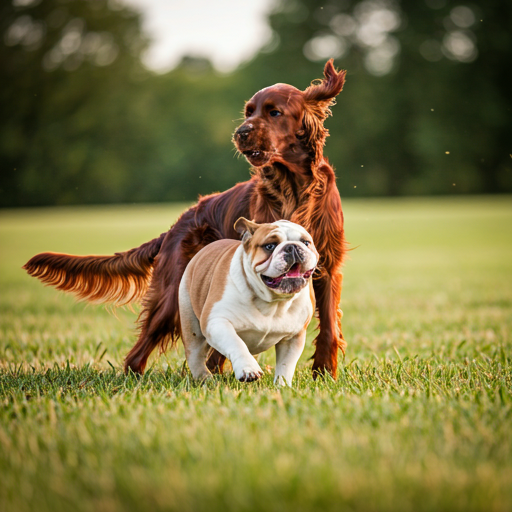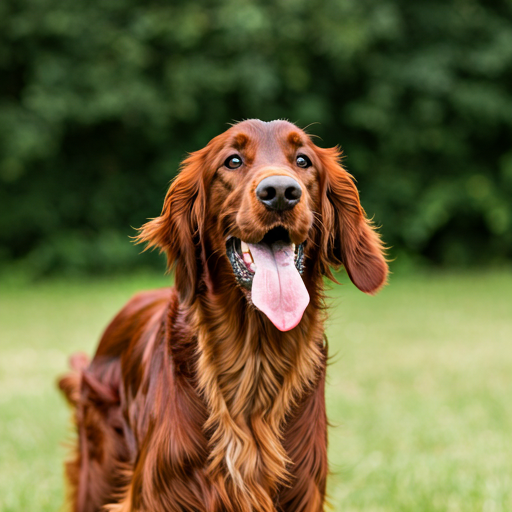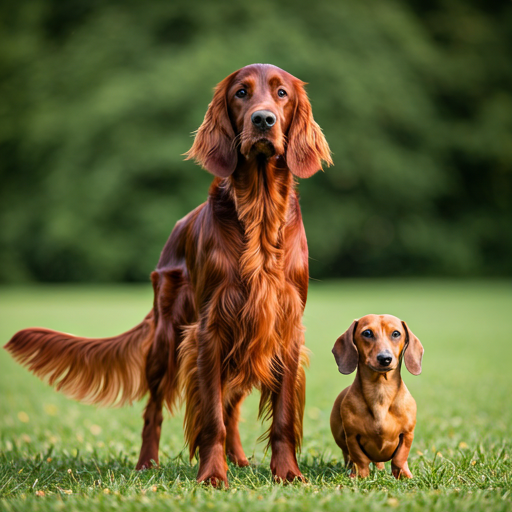Irish Setters are renowned for their vibrant red and mahogany coats, characterized by their silky texture, length, and feathering in specific areas. Proper training and socialization are crucial to prevent aggression issues and ensure they integrate well into a family environment. But like many breeds, they sometimes face misconceptions about their temperament. Are Irish Setters aggressive? No, Irish Setters are not aggressive by nature. They are typically gentle, friendly, and eager to please. However, understanding their high energy levels and the importance of proper training can help prevent any unwanted behaviors, making it worth exploring their temperament further.
Table of Contents
Clearing Up Misconceptions About Irish Setters
Irish Setters are often misjudged due to their exuberance, which can sometimes be mistaken for aggression. The red setter, with its vibrant coat and energetic personality, exemplifies this misunderstanding. While they are energetic and playful, their behavior is typically far from hostile. Clearing up these misconceptions can help hunters, potential owners, hunters and dog enthusiasts appreciate their true character.
Why Understanding Temperament Matters
Understanding a breed’s temperament goes beyond curiosity—it ensures a harmonious relationship between pet, puppy, and owner. The English setter, one of the foundational breeds used in developing the Irish setter, is known for its friendly and loving nature, making it a wonderful addition to family life. Similarly, the Gordon setter, with its calm temperament and adaptability, is celebrated as a pleasant family pet. Knowing what to expect can help prevent misunderstandings and create an environment where both the dog and the family thrive.

The Natural Temperament of Irish Setters
Are Irish Setters Naturally Aggressive or Gentle?
Irish Setters are inherently gentle and affectionate. Known for their sociable demeanor, they tend to form strong bonds with their families and exhibit a loving nature. Aggression is not a typical trait for this breed. This gentle nature makes them wonderful family pets, perfect for households with children and other pets.
When considering an Irish Setter, it is important to adopt or buy an Irish Setter puppy from reputable breeders or rescue groups to ensure the well-being of the the setter puppy, human and the dog.
Key Traits That Define Their Personality
Irish Setters are a breed characterized by their high energy, intelligence, and playfulness. They breed are very smart and also known for their unwavering loyalty and friendly disposition, making them excellent companions. Their intelligence and eagerness to please make the breed them highly trainable, although their playful nature might sometimes require extra patience during training sessions.
Red setters, males in the red setter and male dogs in particular, are a breed noted for their intelligence and trainability, making them a breed suitable for various canine activities such as hunting, flyball, dock diving, hunting and obedience.
Aggression vs. High Energy
Sometimes, their high energy levels can be misconstrued as aggression. It’s crucial most people to differentiate between spirited play and actual signs of hostility. Recognizing this distinction can prevent unnecessary concern. Their exuberance is often a sign of their zest for life, and with proper exercise and mental stimulation, they can be calm and content.
How to Tell the Difference Between Excitement and Aggression
Understanding Their Playful and Energetic Nature
Irish Setters often express their excitement through enthusiastic movements, bounding leaps, and wagging tails. While this may appear overwhelming, a vet say it’s normal and usually a sign of joy rather than aggression. Their playful antics are part of their charm, and the vet say understanding this can help owners appreciate their lively and intelligent nature.
Common Concerns About Aggression
Owners might worry about overzealous puppy behavior, particularly around children, food or other pets. However, understanding the root of this energy can help breeders address and manage any concerns effectively. With consistent training and socialization, these concerns can be minimized, ensuring healthy dog and a peaceful coexistence with other animals and family members.
When hunting and acquiring puppies, it is crucial to vet and choose reputable breeders who provide the puppy with proper health certifications and allow you to meet the puppy’s parents.
Socialization and Its Impact
Socialization helps Irish Setters become well-rounded dogs. Introducing them to different environments, people, and other animals early in life builds confidence and reduces fear-based behaviors. This is crucial for their development and helps them adapt to various situations without displaying fear or aggression.
How to Help Them Build Positive Interactions
Positive experiences with strangers, children, and other pets can shape their demeanor. Controlled introductions, patience, and reinforcement of calm behavior are key to fostering social harmony. Encouraging positive interactions from a young age will help them grow into confident and friendly adults.

Signs of Aggression in Dogs
Body Language That Indicates Aggression
Warning signs like bared teeth, stiffened posture, or prolonged staring should be noted. These signals often precede a reaction and should prompt careful intervention. Understanding these signs can help prevent potential incidents and ensure the safety of both the dog and those around them.
Subtle Signs You Should Never Ignore
Low growls, tucked ears, legs, ears, legs and tails, or avoidance behavior can indicate discomfort or fear. Being attuned to these subtle cues can prevent escalation. Recognizing these signs early allows for timely intervention and helps maintain a positive environment for the dog.
Training to Prevent Aggressive Behaviors
How Proper Training Shapes Their Behavior
Training is essential for shaping a well-behaved Irish and red Setter together. Basic commands and obedience training for red setter establish boundaries and foster trust. Consistent training helps them understand expectations and reduces the likelihood of unwanted behaviors.
The Role of Positive Reinforcement in Building Trust
Using rewards like treats, praise, or play encourages desirable behavior. Positive reinforcement strengthens the bond between owner and dog, reducing the likelihood of aggression. It creates a positive association with good behavior, making training enjoyable for both the dog and the owner.
Factors That Could Lead to Aggression
Environmental Triggers and Stress Factors
Changes in routine, unfamiliar settings, or lack of stimulation can lead to frustration or fear. Identifying and addressing these triggers is key to managing behavior. A stable and predictable environment helps keep them relaxed and content.
Fear-Based Behaviors: What Causes Them?
Fear is often at the root of aggression in dogs. Loud noises, previous trauma, or a dog a history of negative interactions can contribute to defensive or fearful behavior. Understanding these causes allows owners to take steps to mitigate fear and create a secure environment.
The Role of Exercise and Mental Stimulation
How Physical Activity Reduces Behavioral Issues
Regular exercise helps Irish Setters expend energy and reduce stress. A tired but healthy dog also is less likely to exhibit negative behaviors, including aggression. Daily walks, playtime, and engaging activities are essential for their well-being.
Games and Activities to Keep Your Irish Setter Calm
Interactive games, puzzle toys, and active outdoor adventures engage their minds and bodies, helping maintain a calm demeanor. These activities provide mental stimulation, which is just as important as physical exercise in preventing boredom and anxiety.

Interactions With Other Pets
Are Irish Setters Good With Other Dogs?
Irish Setters are generally friendly with other dogs, but proper introductions, grooming and supervision are necessary to avoid misunderstandings. Their sociable nature makes them good companions for other dogs, provided they are introduced correctly.
Preventing Jealousy and Dominance Issues
Training and equal attention ensure that jealousy and dominance over other dogs don’t become problems in multi-pet households. Ensuring each pet feels valued helps maintain harmony and prevents competition for attention.
Aggression Around Children and Families
How They Typically Behave With Kids
Irish Setters are often gentle and playful around children. Their affectionate nature makes them great companions in family settings. Their patience and gentle demeanor make them excellent playmates for children.
Steps to Ensure a Safe Relationship
Supervised interactions, teaching children proper handling, and setting boundaries ensure harmony between Irish Setters and young family members. Educating children on how to interact with dogs respectfully helps build a safe and loving relationship.
Handling Aggressive Behaviors
What to Do if Your Irish Setter Shows Aggression
If aggression arises, remain calm and assess the situation. Avoid punishment, as it can escalate fear and aggression. Instead, focus on understanding the cause and addressing it with positive reinforcement and patience.
When Professional Training May Be Necessary
In cases of persistent aggression, seeking help from a professional trainer or behaviorist can make a significant difference. Professional guidance can provide tailored strategies to address specific issues and improve behavior.
Stranger Danger or Welcoming Nature?
How Irish Setters Respond to New People
Irish Setters are naturally curious and sociable. While they may bark initially, they’re more likely to warm up quickly to strangers. Their welcoming nature makes them excellent companions for social gatherings.
Tips for Managing Their Behavior Around Visitors
Gradual introductions and creating a safe space for your dog can ease their anxiety and ensure positive interactions. Providing a comfortable environment helps them feel secure and reduces stress around new people.
Busting Myths About Aggression in Irish Setters
Why They’re Often Misunderstood
High energy and enthusiasm are often mistaken for a dog aggression. Understanding their true nature dispels these myths. Educating others about their temperament helps improve their reputation as gentle, smart and loving dogs.
Real-Life Examples of Their Gentle Nature
Countless owners share stories of their Irish Setters’ loving and friendly behavior, reinforcing their breed’ reputation as gentle dogs. These anecdotes highlight their affectionate nature and dispel misconceptions about aggression.
Creating a Calm Environment
How Your Home Environment Shapes Their Behavior
A calm house and consistent home reduces stress for Irish Setters, fostering better behavior and a happier, healthy dog too. A stable environment helps them feel secure and content, promoting positive behavior.
Reducing Anxiety Through Consistency
Regular routines and predictable environments provide security, reducing the likelihood of aggression stemming from anxiety. Consistency in young age and daily activities helps them understand expectations and reduces stress.
Leadership and Boundaries
Setting Clear Expectations Without Harsh Discipline
Gentle but firm boundaries help Irish Setters understand acceptable behavior without instilling fear. Clear guidelines and consistent reinforcement help them learn appropriate behavior.
How to Be a Confident, Calm Leader for Your Dog
Consistency, patience, and confidence in your interactions build trust and respect between you and your dog. Being a calm and assertive leader helps them feel secure and encourages positive behavior.
The Importance of Understanding Breed-Specific Behavior
Individual personalities and circumstances of female and male dogs often play a larger role in behavior than breed alone. Understanding the unique traits of each breed of dog helps tailor care and training to their specific needs.
Recognizing Individual Personality Traits
Appreciating each dog’s unique traits helps owners provide the right guidance and care. Recognizing their individuality allows for a more personalized approach to training and care.
Building Trust With Your Irish Setter
Strengthening the Bond Between You and Your Dog
Quality time, positive reinforcement, and understanding other dogs and their needs deepen the bond and reduce fear-based behaviors. A strong bond fosters a sense of trust and encourages a loving relationship.
How Trust Mitigates Fear-Based Aggression
A trusting dog is a confident and calm dog. Building trust prevents misunderstandings that may lead to aggression. Trust is the foundation of a healthy and happy relationship with your Irish Setter.
Conclusion
Are Irish Setters Aggressive? The Final Verdict
Do Irish Setters get aggressive? Irish Setters are not naturally aggressive but require proper training, socialization, grooming, and understanding to thrive as loving companions. With the right approach, they can be delightful and affectionate members of the family.
Tips for Raising a Well-Behaved, Loving Companion
Consistency, patience, and proactive care help Irish Setters shine as gentle, intelligent and devoted members of the family. These smart, beautiful dogs, with their mahogany coats and lively spirits, make wonderful family pets and are truly a joy to have by your side.












Pingback: How to Socialize an Aggressive Dog with Humans: Key Strategies for Irish Setters - Setterpedia